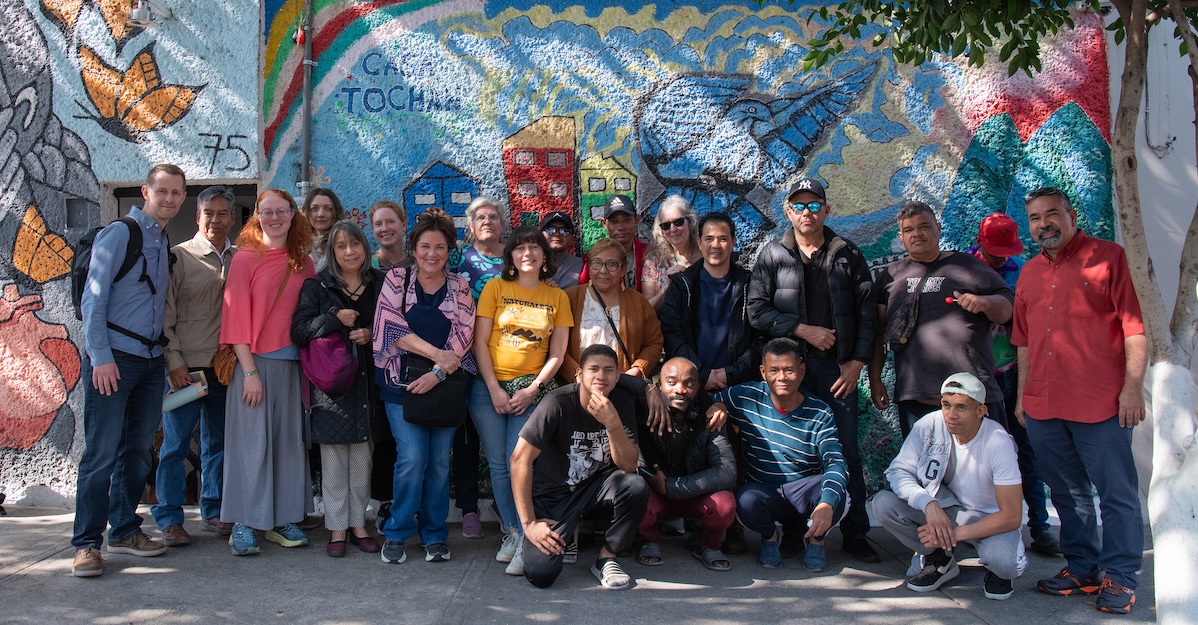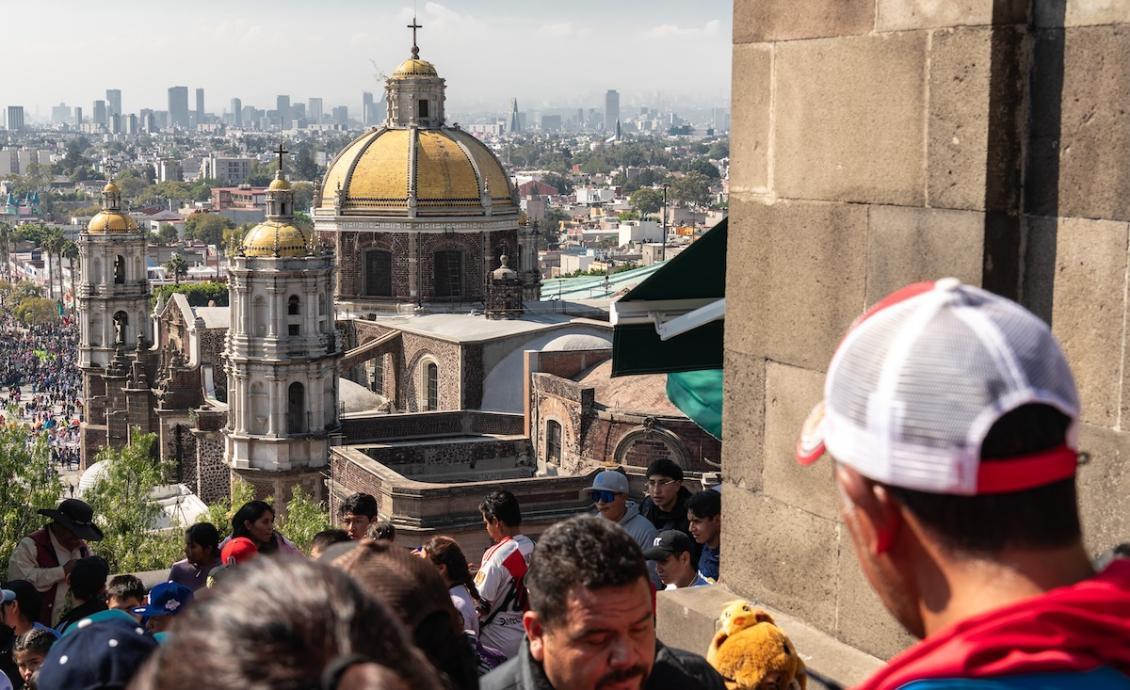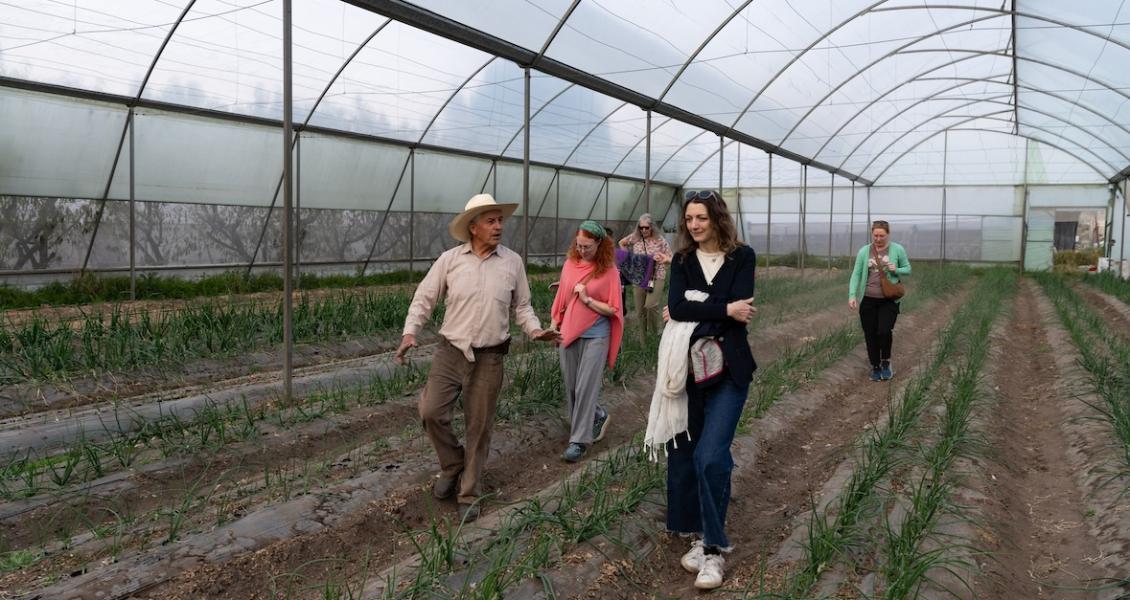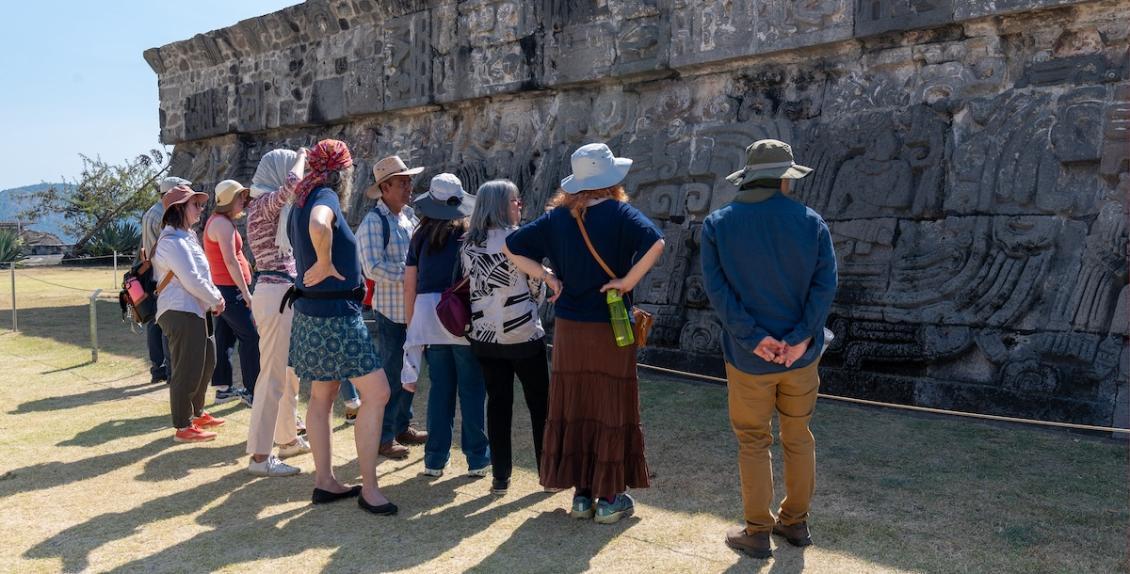/130x0:1070x600/prod01/channel_34/media/seattle-university/news-amp-stories/images/Mexico-immersion-man-painting-mural.jpg)
Led by Dr. Jeanette Rodriguez and Arturo Araujo, S.J., the Guadalupe Faith & Hospitality Immersion Experience in Mexico offers deep insights into social justice, theology and more.
As Seattle University prepares students to solve today’s most pressing challenges while expanding their global perspective, it makes sense that faculty and staff—who inspire in the classroom and support students in navigating college life—should be intimately familiar with these challenges.
To this end a group of faculty and staff (including alumni) embarked on a cultural immersion journey in Mexico. Led by Dr. Jeanette Rodriguez and Arturo Araujo, S.J., the Guadalupe Faith & Hospitality Immersion Experience—held during the Feast of Our Lady of Guadalupe last December—offered participants a firsthand encounter with social justice issues and spiritual enrichment as they spent time among the people of Cuernavaca and Mexico City. Participants on the trip represent a range of programs and departments across campus that include the Institute for Catholic Thought and Culture, University Advancement, the Provost’s Office, Albers School of Business and Economics, Matteo Ricci Institute, University Core, Campus Ministry and the Center for Environmental Justice and Sustainability.

The immersion focuses on three areas—immigration, poverty and sustainability—with participants engaging one-on-one with Indigenous people, agricultural leaders, theologians and artisans alike.
Those on the trip met with immigrants who had been kidnapped by cartels, organic farmers seeking a more sustainable approach to their ag business, artisans working to uphold their culture and Indigenous people in the communities they became enmeshed with as part of the journey. And the group was among the 10 million-plus who converged upon Mexico City’s Basilica of Our Lady of Guadalupe for the world’s largest Catholic pilgrimage.

Mexico City’s Basilica of Our Lady of Guadalupe.
Throughout the trip there were meaningful immersive activities. Key experiences included learning about the liberation story of Tonantzin, also known as Nuestra Señora de Guadalupe, exploring Indigenous spirituality and land stewardship and engaging with community leaders advocating for social and environmental justice. Through structured reflections and interactions with grassroots organizations, the faculty and staff on the immersion gained a deeper understanding of Mexican culture, migration struggles and the resilience of Indigenous communities.
Dr. Rodriguez’s connection to this immersion runs deep. When she first arrived on the Seattle University campus in 1990, the professor’s interest was piqued when she learned of a retreat-style immersion trip to Mexico led by the School of Theology and Ministry. Two years later she would join this trip and while doing so witnessed opportunities to tweak its structure into one that would engage faculty and staff in a seminar-and-retreat-like experience that afforded participants opportunities to understand the people, culture and issues of Mexico.
Working with Benedictine sisters, Rodriguez helped reorganize and broaden the immersion to include lectures from theologians, politicians, Indigenous peoples, women’s co-ops, organic farmers and others “so that it was really a professional development experience within the context of a spiritual retreat,” says Rodriguez, who would ultimately take over these trips and has been leading groups to celebrate the Feast of Our Lady of Guadalupe each December for more than 20 years.
These immersions also have a strong underpinning of faith and theology while cultivating among faculty and staff a real sense of community and understanding of the lives and purpose of those they engage with while on the ground, something important to Rodriguez.
“When I first arrived at Seattle University in the 1990s, they were very few Latinx professors and or staff members. It was also in the ‘90s when NAFTA emerged,” says Rodriguez, who in addition to teaching theology and religious studies is also director of the Institute for Catholic Thought and Culture (ICTC), which organizes the immersion. “I felt that people really needed to understand that Mexico was more than just border towns. Theologically I wanted people also to understand the profound theological contributions that the religious sector from Mexico and Latin America have made to theological discourse.”
Father Araujo says the immersion fostered a deeper understanding and reflection among both the community members and the participants, observing day-to-day realities and entering meaningful dialogue, often with transformative outcomes. The significance of the immersion happening in the context of the Feast of Our Lady of Guadalupe provided faculty and staff a unique opportunity to celebrate her mercy and graciousness, says Fr. Araujo, “and we lifted the cries of those who continue to struggle, asking her to guide us as we navigate the urgent issues of our time."
“A central part of this journey was learning from the wisdom and generosity of the local Indigenous people. They helped us understand the complexities of life in Mexico—the struggles over land tenure, the role of religion, the impact of organized crime, migration and the evolving dynamics of gender,” says Fr. Araujo. “Their voices, often unheard, offered us a lens to see beyond statistics and policies into the lived realities of resilience and resistance.”

Immersion participants visit with a local farmer.
AN UNFORGETTABLE, TRULY TRANSFORMATIVE EXPERIENCE
Joyce Allen, ’09, from the Matteo Ricci Institute, came away from the trip with a renewed sense of what’s most important in life as she relates the experience to her own life.
“We were given opportunities to learn about and to witness Indigenous wisdom, faith in the promise of the Virgin of Guadalupe, painful migrant journeys, liberation and feminist theology in action and the wonders of Benedictine hospitality and work among the poor,” says Allen.
Estefanía Kendall, senior administrative assistant at ICTC, described the experience as transformative, deepening her understanding of social justice issues and highlighting the resilience of Indigenous communities.
“Hearing the inspiring stories of migrants and Indigenous leaders showed me the incredible strength of community and resilience in tough times. When we visited the Basilica of Our Lady of Guadalupe during the Feast of Our Lady of Guadalupe, I felt the deep cultural and spiritual connections that bring people together in their quest for dignity and justice,” says Kendall. “Interacting with cooperatives and grassroots organizations was a reminder of alternative economic models based on solidarity and sustainability, which I, as a Latina, grew up with.”

For Jessica Imanaka, PhD, associate professor in management, this was the first time on this immersion trip. Like others who joined her, she describes the experience as transformative, one that deepened and challenged her faith.
“The Feast of Our Lady of Guadalupe swept me up in a set of collective devotional practices that touched me at the core of my being and enabled me to access a different part of my being where from to call on the assistance of Our Lady as we navigate the dark and frightening times ahead,” she explains. “This experience profoundly altered my sense of priorities and perspectives on the immigration crisis facing our nation as I came to see how Christ journeys with migrants and the obligation of Christians and all persons to respect the human dignity of migrants … and offer hospitality from our own material, cultural and intellectual resources."
In the 25 years Laura Hauck-Vixie has worked at Seattle University, she says this immersion was “easily one of the Top 5 experiences I have had.” The Assistant Director of the University Core and First-Year Academic Engagement cites the opportunities it afforded to connect with colleagues, reenforced by the hospitality and insights of the Benedictine sisters “who inspired us and reminded me of the interconnectedness of humanity.”
“Dr. Rodriguez’s vast knowledge of the faith traditions and her meaningful connections in Mexico with our guides Nacho and Lisanne made for a well-planned and rich immersion,” says Hauck-Vixie. “During this week, we heard stories of struggle, conquest, oppression, forced labor, stolen lands, but also hope, resilience and community. We witnessed the pilgrimage leading up to the Feast of Our Lady of Guadalupe, which was a humbling experience of faith and devotion.”
/0x142:2400x1658/prod01/channel_34/media/seattle-university/news-amp-stories/images/Helfgott-photo.JPG)
/0x20:1130x734/prod01/channel_34/media/seattle-university/news-amp-stories/images/CAS_WinterConversations-1130X753.jpg)
/0x38:2400x1554/prod01/channel_34/media/seattle-university/news-amp-stories/images/Jerron-Lowe-portrait.JPG)